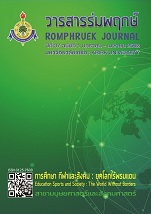การจัดการความคาดหวัง : เครื่องมือสร้างคุณภาพในองค์กรบริการ
Main Article Content
บทคัดย่อ
การจัดการความคาดหวังของผู้รับบริการ คือกุญแจสำคัญที่จะขับเคลื่อนองค์กรบริการของประเทศไทยมีความสามารถในการแข่งขัน หากผู้บริหารและพนักงานในองค์กรบริการให้ความสำคัญกับการจัดการความคาดหวังของผู้รับบริการ ก็จะกลายเป็นองค์กรที่ให้บริการอย่างมีคุณภาพ ซึ่งความคาดหวังในการบริการนั้นเกิดจากการที่ผู้รับบริการได้รับรู้ข้อมูลองค์กรบริการจากแหล่งต่าง ๆ ประมวลเป็นความคาดหวังในการบริการ แล้วนำมาเป็นข้อมูลตัดสินคุณภาพการบริการ ว่าได้รับการตอบสนองที่เป็นไปตามความคาดหวังหรือไม่ หากได้รับบริการตามที่คาดหวังผู้รับบริการก็จะตัดสินว่าบริการนั้นมีคุณภาพ หากผู้บริหารกับพนักงานในองค์กรบริการสามารถรับรู้ความคาดหวังของผู้รับบริการได้ครบถ้วน โดยการประยุกต์ใช้เครื่องมือในการวิเคราะห์ความคาดหวังของผู้รับบริการ อย่างแบบสำรวจ SERVQUAL ก็จะมีข้อมูลจัดเตรียมบริการ หรือพัฒนานวัตกรรมการบริการให้ตรงกับความคาดหวัง ส่งผลให้ผู้รับบริการเกิดความพึงพอใจ และหากตอบสนองเกินที่คาดหวังก็จะสร้างความประทับใจ กลายเป็นความจงรักภักดีต่อองค์กรบริการ การจัดการความคาดหวังจึงเป็นตัวชี้วัดศักยภาพการแข่งขันขององค์กรบริการยุคประเทศไทย 4.0
Article Details
ทุกบทความที่ตีพิมพ์ในวารสารมนุษยศาสตร์และสังคมศาสตร์ร่มพฤกษ์เป็นทัศนะและข้อคิดเห็นของผู้เขียนมิใช่ทัศนะของมหาวิทยาลัยเกริกหรือกองบรรณาธิการ การนำบทความส่วนใดส่วนหนึ่งหรือทั้งหมดไปพิมพ์เผยแพร่ต้องอ้างอิงที่มาให้ชัดเจน
เอกสารอ้างอิง
กนกพร ลีลาเทพินทร์ พัชญา มาลือศรี และ ปรารถนา ปุณณกิติเกษม. (2554). การประเมินระดับคุณภาพ
การบริการของโรงพยาบาลรัฐบาลในกรุงเทพฯ ด้วยแบบจำลอง SERVQUAL. วารสารวิจัยและพัฒนา มจธ, 34(4), 443-456.
การบินไทยและวิทยาลัยดุสิตธานี. หลักสูตรพัฒนาคุณภาพการบริการให้กับลูกเรือที่บริการชั้นเฟิร์สคลาส
กรุงเทพธุรกิจ. (20 มีนาคม 2561) สืบค้นจาก http://www.bangkokbiznews.com/news/detail/792744.
จิตตินัทท์ นันทไพบูลย์. (2551). จิตวิทยาการบริการ. กรุงเทพฯ : ซีเอ็ดยูเคชั่น.
นพมาศ อุ้งพระ. (2553). จิตวิทยาสังคม. กรุงเทพฯ : โรงพิมพ์มหาวิทยาลัยธรรมศาสตร์.
พิทยา สุวคันธ์. (2557). ภูมิยุทธศาสตร์ของบรรษัทข้ามชาติจีนใน สปป.ลาวและเวียตนาม.
วารสารสังคมศาสตร์มหาวิทยาลัยวลัยลักษณ์, 7(7), 279-330.
ฤดี หลิมไพโรจน์. (2557). การตลาดบริการ. ปทุมธานี : สำนักพิมพ์มหาวิทยาลัยกรุงเทพ.
สำนักงานคณะกรรมการพัฒนาการเศรษฐกิจและสังคมแห่งชาติ. ร่างยุทธศาสตร์ชาติ 20 ปี.
(20 กันยายน 2560) สืบค้นจาก http://www.nesdb.go.th/main.php?filename=index.
สำนักงานคณะกรรมการพัฒนาการเศรษฐกิจและสังคมแห่งชาติ. แผนพัฒนาเศรษฐกิจและสังคมแห่งชาติ
ฉบับที่ 12. (20 กันยายน 2560) สืบค้นจาก http://www.nesdb.go.th/ewt_news.php?nid=6420.
Boulding, W., Kalra, A., Staelin, R., & Zeitthaml, V.A. (1993). A Dynamic Process Model of Service
Quality : From Expectations to Behavioral Intension. Journal of Marketing Research, 30(1), 77-85.
Davidow, W.H., & Uttal, B. (1989). Service Companies : Focus or Falter. Harvard Business Review, 67(4), 84.
Fitzaimmons, J. A., & Fitzaimmons, M. J. (2011). Service Management (7thed.). NY: McGraw-Hill.
Nisreen, S., Salah Eldean., Mariyam, S. Bartamani. (2018). University Service Quality in the
Community Service and Continuing Education Center at Sultan Qaboos University : An Empirical
Study Using SERVQUAL Scale. Journal of Educational and Psychological Studies, 12(1), 16-39.
Parasuraman, A., Berry, L. L., & Zeithaml, V. A. (1991). Understanding Customer Expectations of Service.
Sloan Management Review, 32(4), 39-48.
Parasuraman, A., Zeithaml, V. A, & Berry, L. L. (1985). A Conceptual Model of Service Quality and Its Implications for Future Research. Journal of Marketing, 49(1), 48.
Parasuraman, A., Zeithaml, V. A. & Berry, L. L. (1988). SERVQUAL: A Multiple-Item Scale for
Measuring Customer Perceptions of Service Quality. Journal of Retailing, 64(1), 12-40.
Zeitham, V. A., Bitner, M. J. & Gremier, D. D. (2009). Service Marketing : Integrating Customer
Focus Across the Firm. (5thed.). NY : McGraw-Hill.


